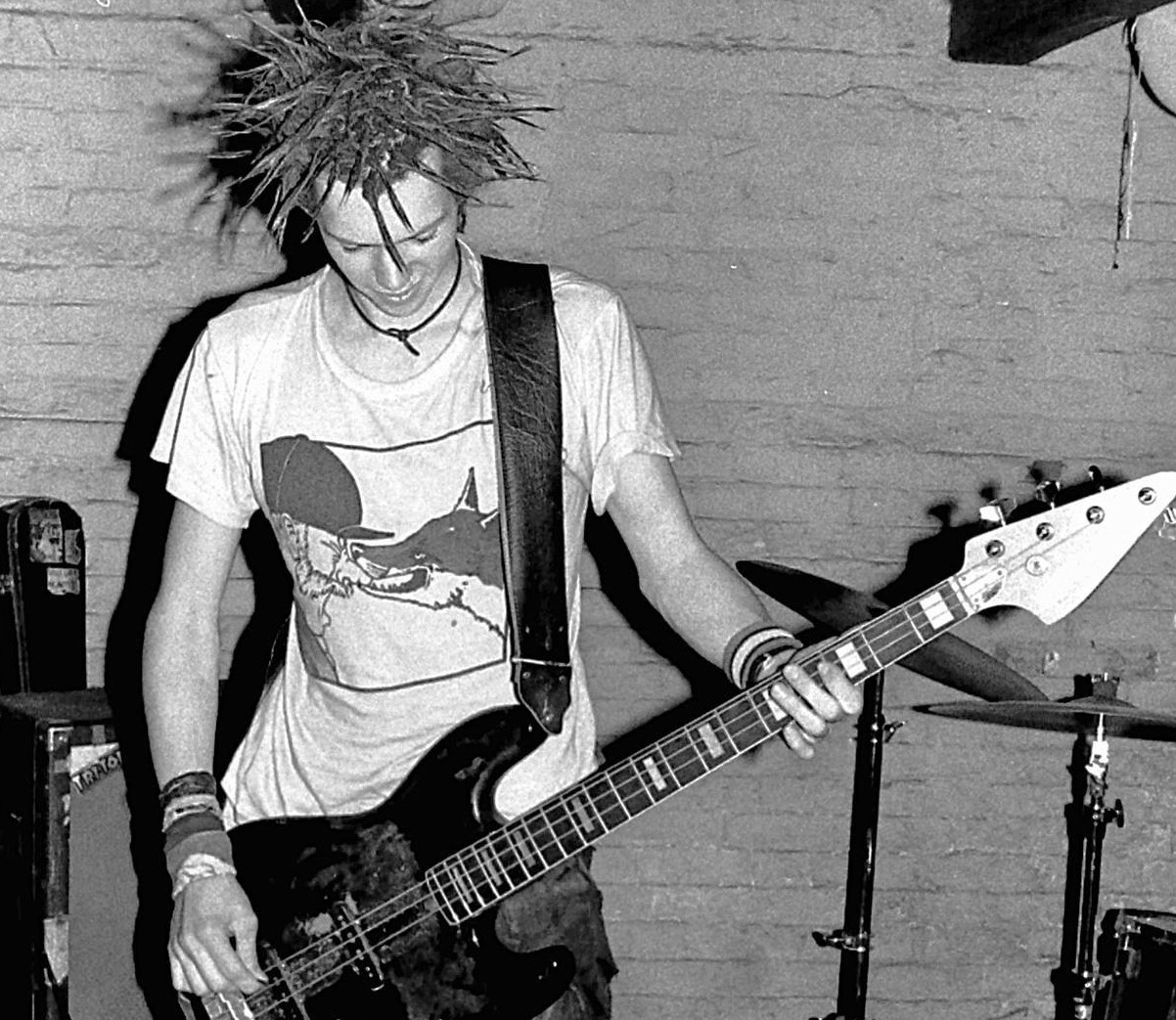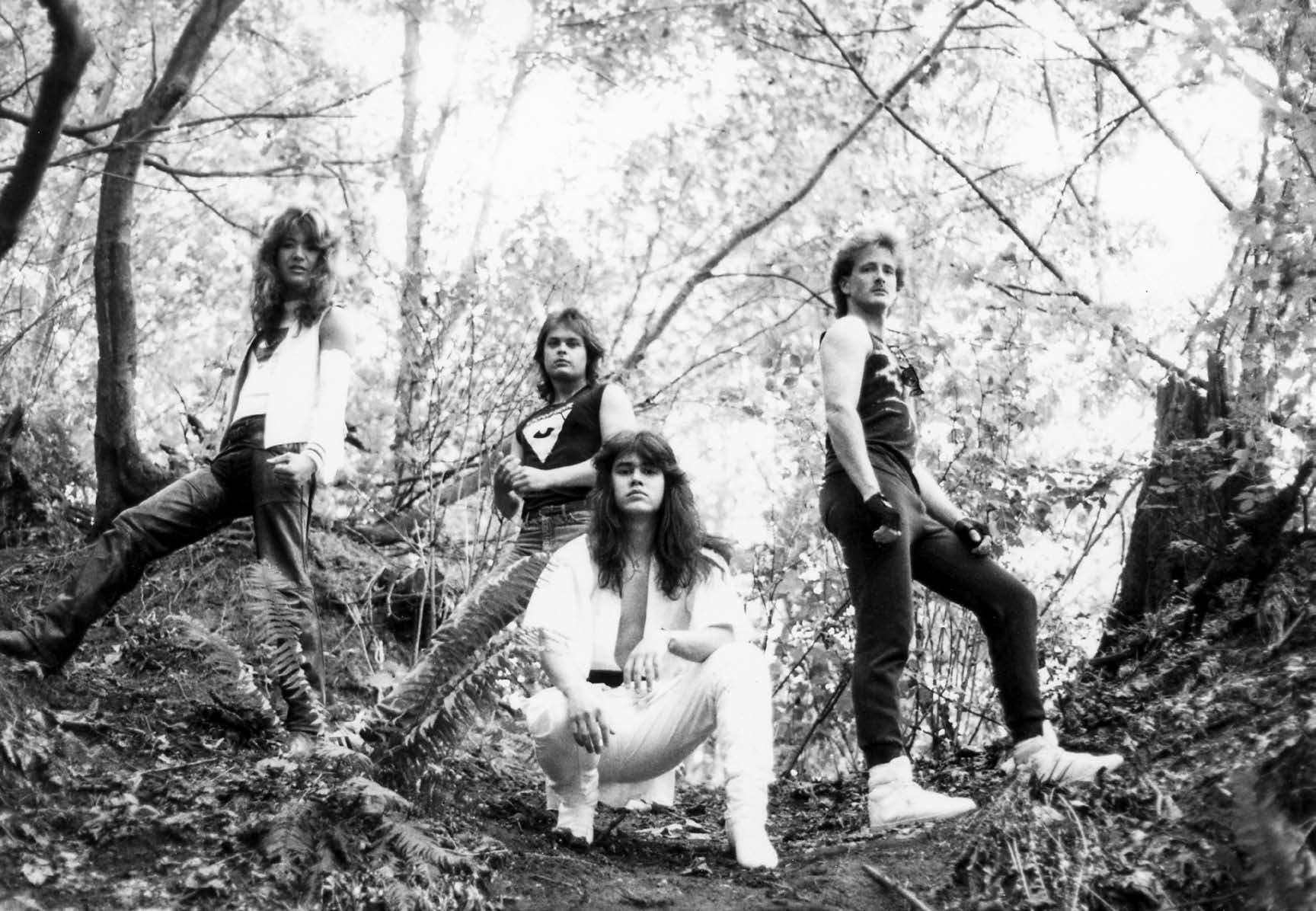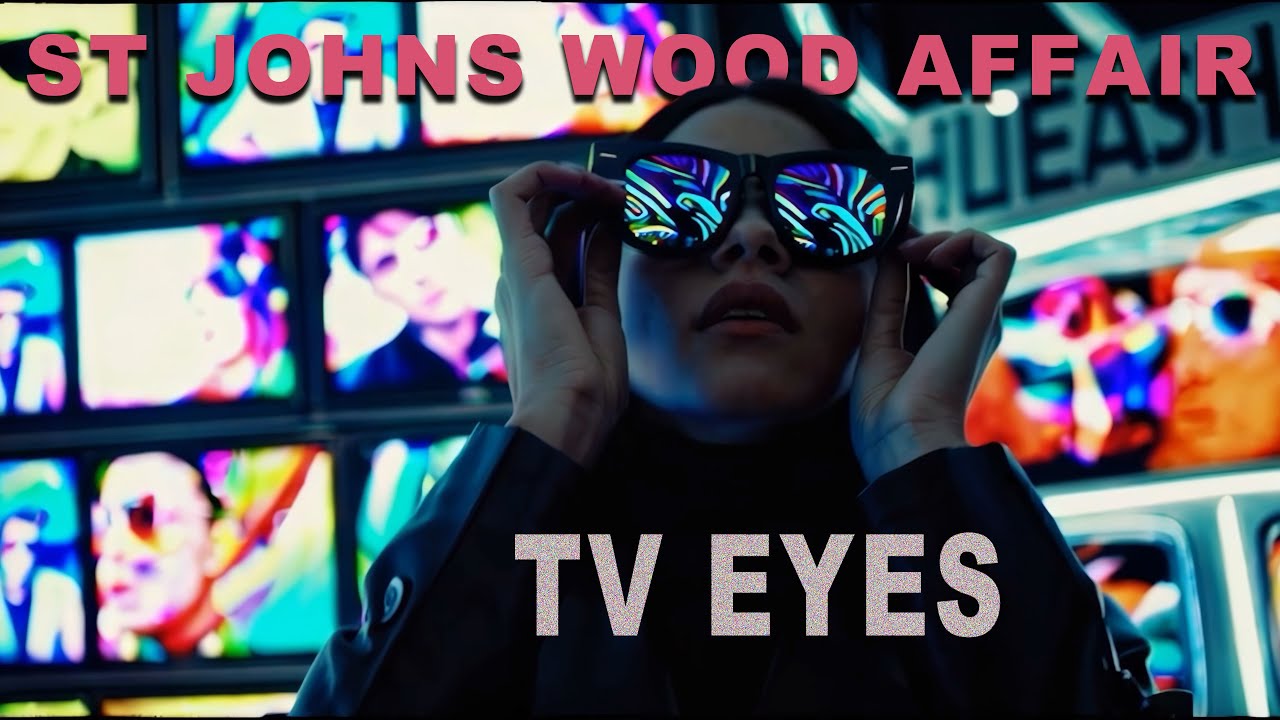Corvus | Doom | Extreme Noise Terror | Cain | Interview | Pete Nash
Pete Nash has been a staple of the underground punk scene, cutting his teeth in the anarcho-punk band Doom and a slew of other acts.
He first made waves with Doom from 1986 to 1992, where his raw energy and anarchist ethos helped shape the band’s relentless sound. Prior to Doom, Nash was part of the chaotic punk ensemble The Anti-Gothic League, where the band’s name was as absurd as their unpolished performances. Nash’s journey didn’t end with Doom; he also brought his distinct style to the experimental, nihilistic band Filthkick, which took punk into darker, more bizarre territories. In the mid-90s, he co-founded Cain, a doom metal band that dabbled in the heavy and psychedelic, characterized by a bleak and atmospheric sound. Nash’s ventures continued with Lithium 6, a project that flirted with industrial influences but ultimately saw him step away, leaving a legacy of boundary-pushing experimentation and punk irreverence. His latest project is called Corvus, where he continues to have fun creating and experimenting with various ideas.
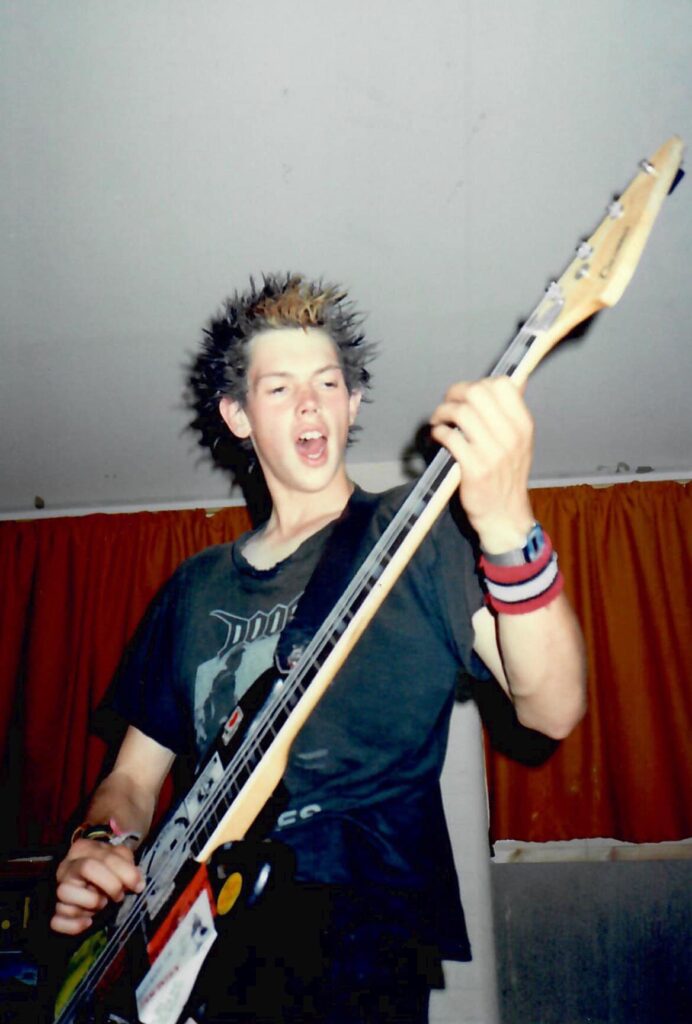
“You have a right to exist”
Would you like to share about your upbringing? Where did you all grow up? Tell us about daily life back in your teenage years.
Pete Nash: We all grew up in a village on the outskirts of Solihull, West Midlands. We were all working-class kids and went to school and hung out together with the same or similar outlook on life, discovering and experiencing the world and sharing all the newfound information.
Being from working-class backgrounds in that area, I suppose we all felt alienated, being scruffy and probably a bit uncouth! In fact, just being young was an outrage. You were told to shut up and do as you’re told. And when you grew up, you were still being told the same: know your place! People would look down at you as if you were some sort of subhuman. Nice!
When we discovered punk, it empowered us. It said to me, you don’t have to play their game, you have the power to reject their prejudices, you are not second class, you have a right to exist, and you should not take any more of their sheeeeeeeiiittte!
Was there a certain scene you were part of? Maybe you had some favourite hangout places? Did you attend a lot of gigs back then?
There were a lot of gigs back then in Birmingham. They were all over the city, but our favourite place was The Mermaid pub in Sparkbrook, for so many reasons.
The Brummie pub that birthed grindcore: the Mermaid, Sparkhill
Mermaid – Sparkhill Birmingham
There were constant gigs all over the week and loads of punk bands we knew about played. You could actually get into the pub with “no questions asked.” It didn’t cost very much to get in (although we had to sneak in a lot of the time; £1.75 was too much), and you could get served very cheap and very strong scrumpy. There were lots of different styles of music playing there, but at the time we were more interested in the anarcho-punk and hardcore bands.
If we were to step into your teenage room, what kind of records, fanzines, posters, et cetera would we find there?
Musically, as a teenager, I was only interested in punk. I was very blinkered, and any listening to other musical tastes, I thought, was a sign of non-dedication to the cause. Hahaha! What a bell end! There were a few exceptions, but it was only when I left home that I began to really listen to different genres.
There were hundreds of fanzines going around at the time. Most of them were home-made zines, from the likes of Angry to the Raising Hell zine. A lot of them were just one-off editions with band interviews, articles about the next protest march, or how to make a veggie burger, brew your own ale/cider, and just highlighting the things everyone in the scene was talking about. You would be able to pick them up at the gigs for a couple of pence and read them while listening to an album.
Most of the tapes and vinyl were punk, from Crass, Chaos UK, Disorder, Amebix, Anti Sect, Flux of Pink Indians, Discharge, M.D.C., Crucifucks, and loads of stuff from around the world, etc., etc., etc.
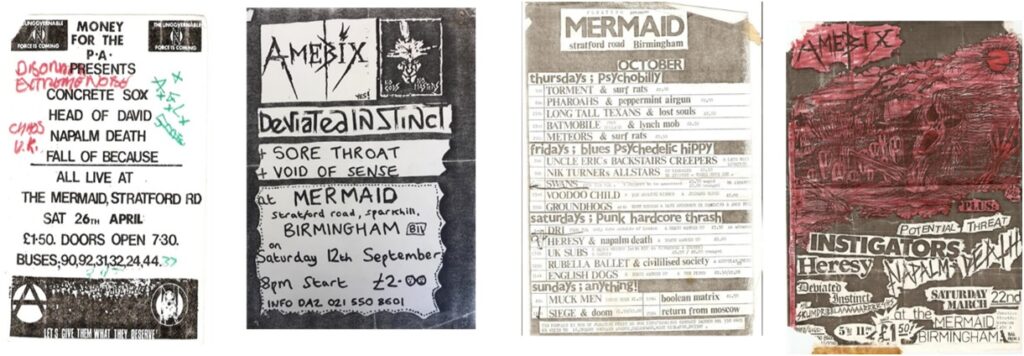
Was AGL your very first band or were you involved with any other bands? You mentioned before that you had some noisy bands. How were you called?
AxGxL (Anti Gothic League) was the first band. The guitarist and I were thirteen, and the drummer, I think, was twelve years old. After seeing so many bands at the pub, it had given us a keen DIY ethic. We thought that it looked like fun. You could go up and make as much of a racket and play as fast as possible. You were allowed! With a truly “dumb arse” name, we could piss off as many people as possible; an aural assault. It sounds like a cliché, but we really could not play for shit! Tuning was, “whatever!” and “conformist!” And song construction was, “what the fuck is that?” Our friend Nik was in a band, and he showed us how to construct a song. We did not have a clue. It’s all his fault! At the time, we had no real message, just lamenting the shitty suburban lives we were living, getting boozed up, and having a “laff.”
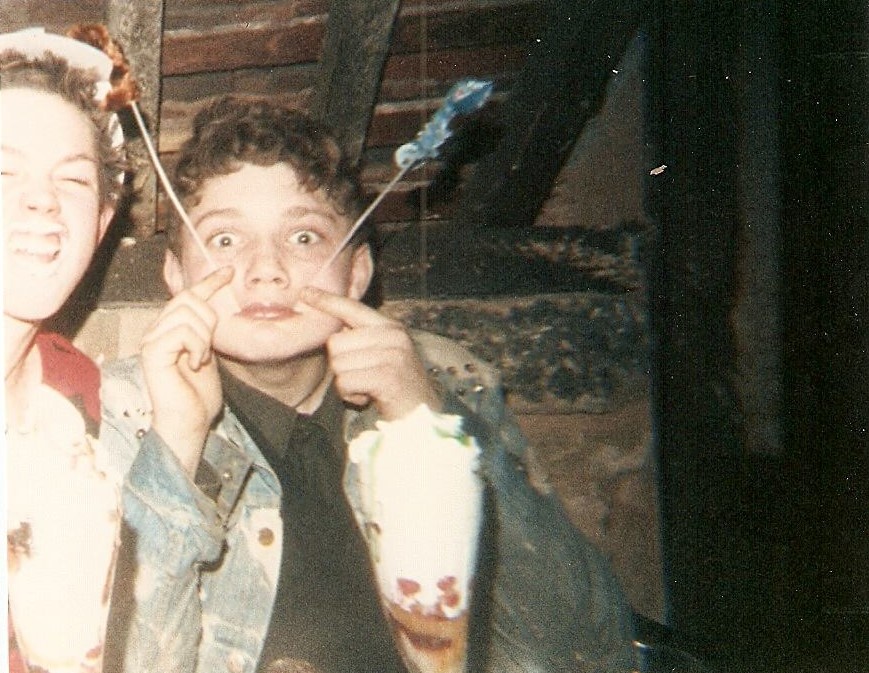
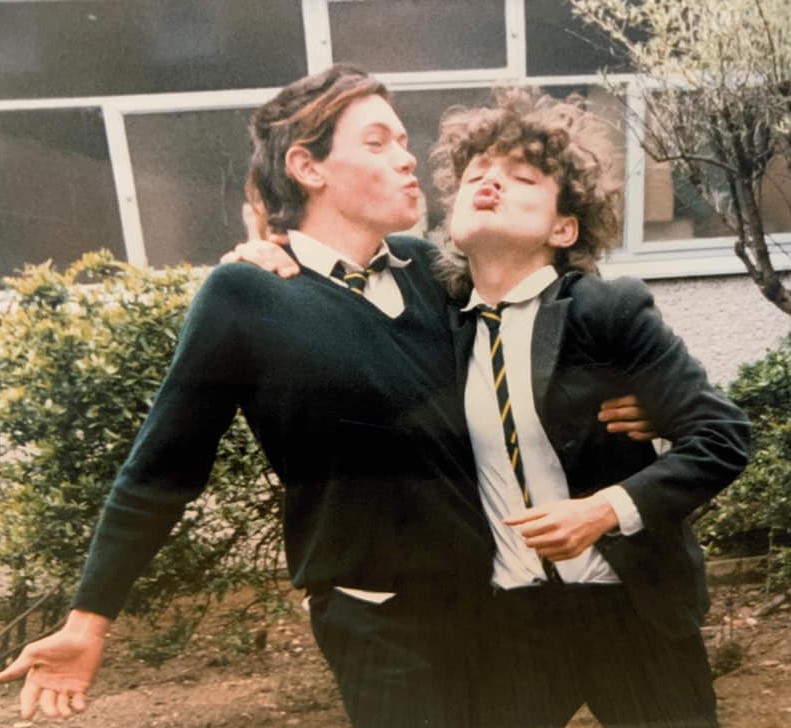
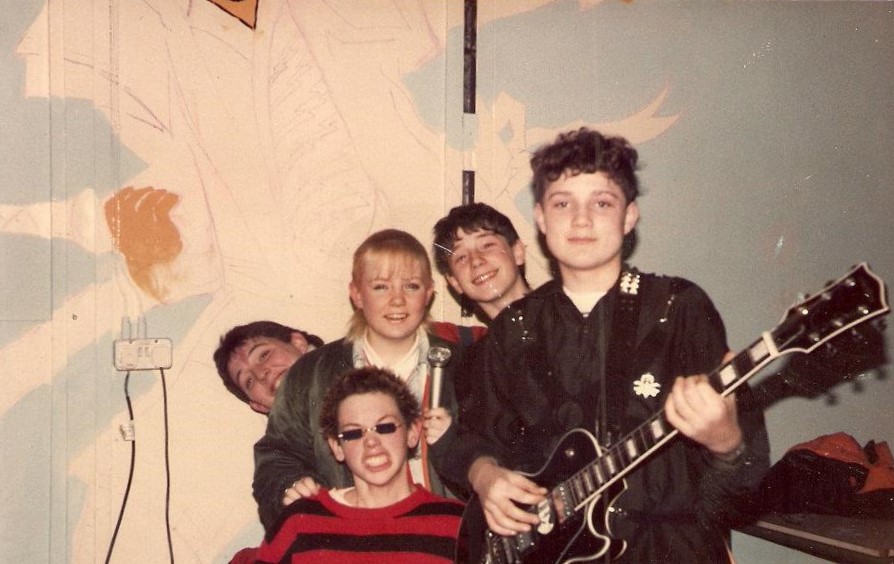
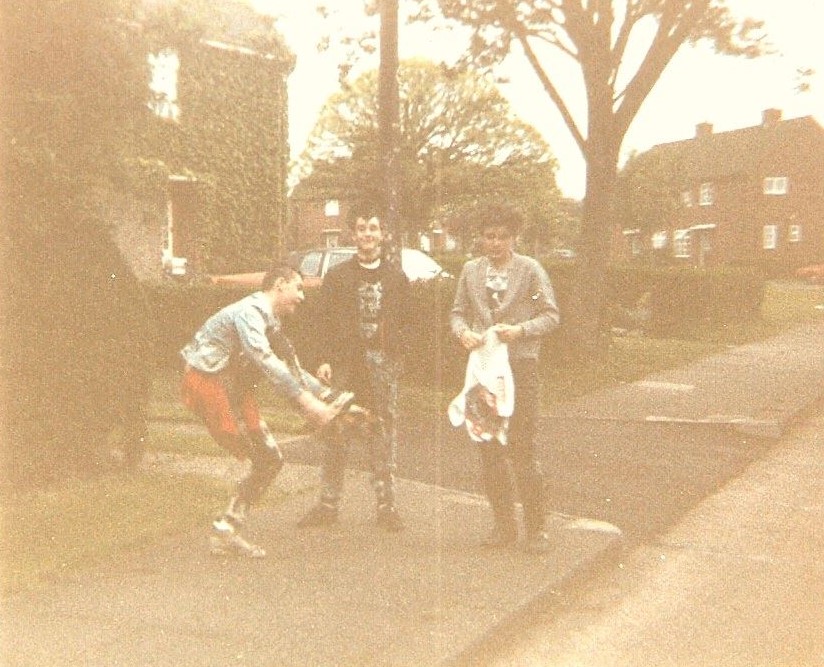
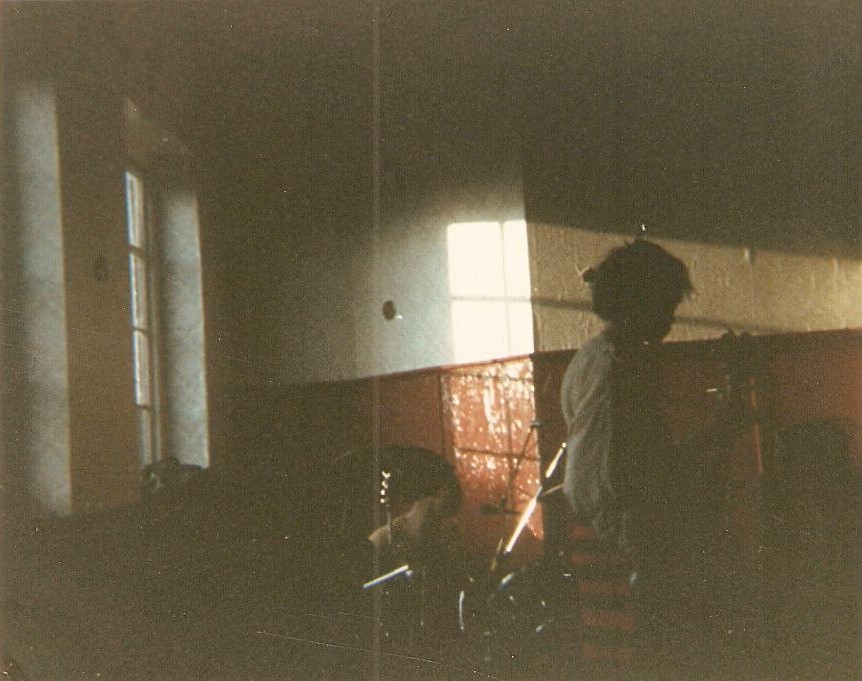
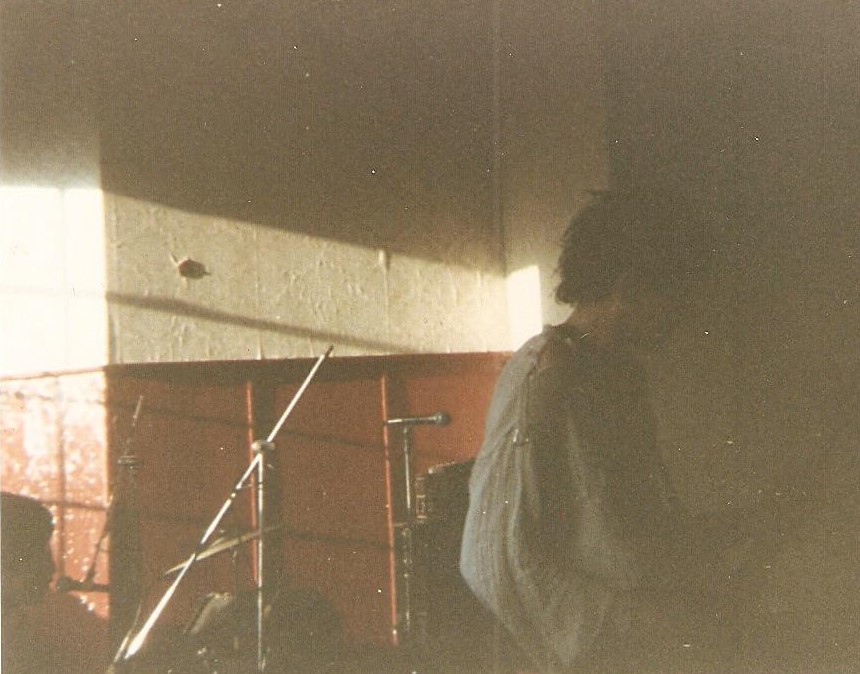
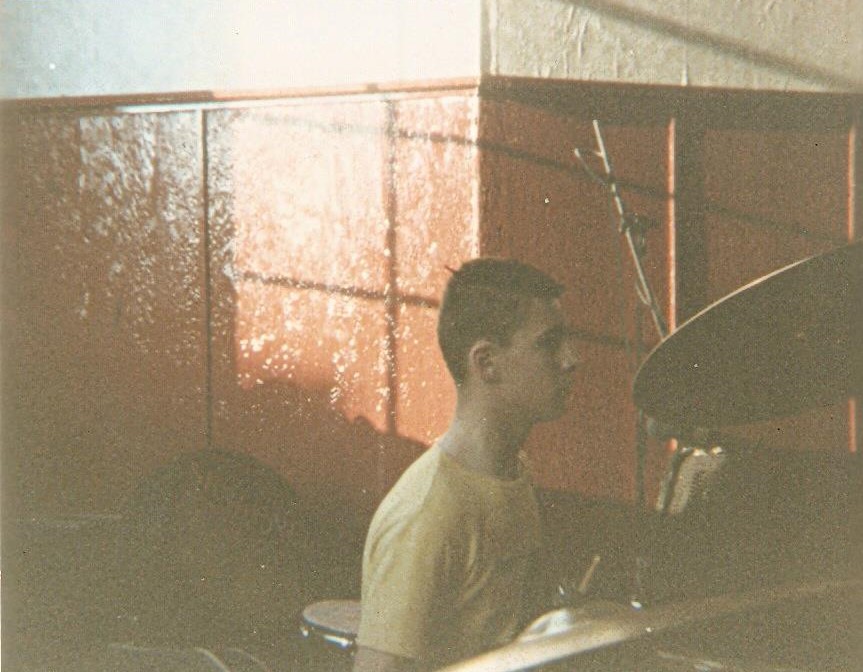
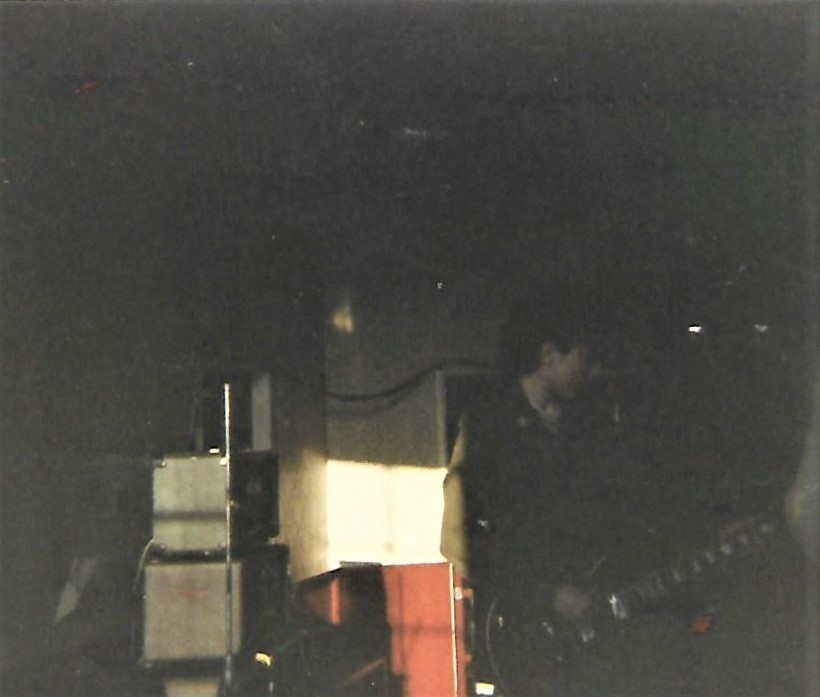
I love the name Anti Gothic League…
Yes, truly absurd! Well, they had stupid hair, ha, ha, ha. We called ourselves The Urban Shit Lickers beforehand. We only did about six gigs. At the first gig, the sound man said we could get up and start. So, we got up and did our set. We had just finished when he said that the sound check was over and we could start playing. We looked at each other, shuffled our feet a bit, and did the whole set again. It was about six songs long and lasted about five minutes. I don’t know why I have written so much about it. It was just kids messing around and was truly dreadful, but a “doss.”
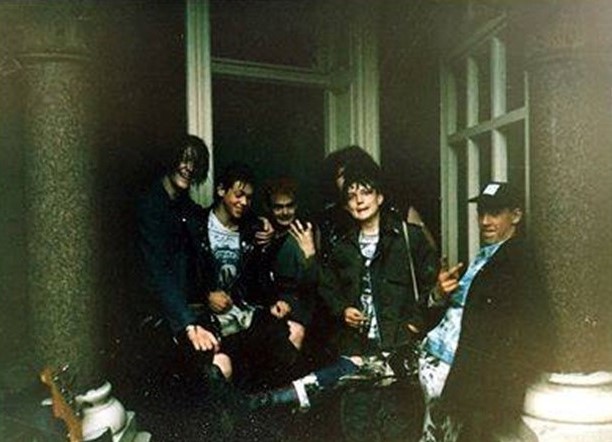
What about The Motherfuckers from Mars and “Noise Not Music”? Were the same people involved with these bands?
Motherfuckers from Mars was another “doss” band. It was half of the then A.G.L., me and Bri (pre-Doom), and half of Napalm Death. Nik played bass, Rat played drums, Bri played guitar, and I sang. Nik would give me the lyrics a few minutes before we went on, and I would read off the sheet as we were playing. We never rehearsed; it was a spontaneous outburst of noise. A truly glorious racket! I think we managed to clear the room at nearly every gig, which was hilarious.
There were a few bands like this popping up at the time. They would get up, make as much noise as possible, and have a laugh while doing it. It was like music vandalism—deconstructing what was thought of as music and smashing the shit out of it. This was where the saying, ‘Make Noise Not Music,’ came from. It was not a band name. I suppose we were learning how to play and experimenting. Again, a real load of old bollocks, just kids messing around.
You played with Doom from 1986 to 1992. How did you originally meet the members, and what led you to join them?
I met Jon and Bri at The Mermaid pub. We were all about the same age, enjoyed the same music, and had all been “indoctrinated” with the anarcho-punk ethos. We stayed at each other’s houses after gigs, traded tapes, and were in the same ‘doss’ bands.
Bri asked me to join Doom, a punky Celtic Frost-style band. I think it was near the end of ’86. At the time, Mick Harris was playing drums and was probably “weakened” by the sound and left. I had just learned all the songs when Bri suggested we should change our style to a more original sound, a bit like the Swedish hardcore punk bands we were all really into. They were mainly Discharge clone bands with a really intense sound.
Stick joined a few months later after reading an advert in The Mermaid. When I first met him, I was like, “What the fuck! He is a bloody hippy and looked like Neil out of The Young Ones.” But I soon realized he knew more about punk and everything else than I did (being about one hundred and fifty years old). He knew his shit and would take no shit!
“The band had a “full-on” anarcho-punk vision”
Where did you have rehearsal space, and what would you say was the overall vision of the band back then at the beginning?
The rehearsal spaces were all over Birmingham, usually in really cheap shitholes. The band had a “full-on” anarcho-punk vision. We were protesting against the racist, sexist, homophobic, greedy, oppressive, selfish Thatcherite society we were living in, and we were not going to take any of that shit. We wanted to be free from the exploitative capitalist system, which we thought was destroying “our” world. Instead of spending money on defense, why not spend it on medicine, hospitals, and canceling third-world debt? Basically, we just wanted to live in a fairer and more equal society, where people treated each other with respect.
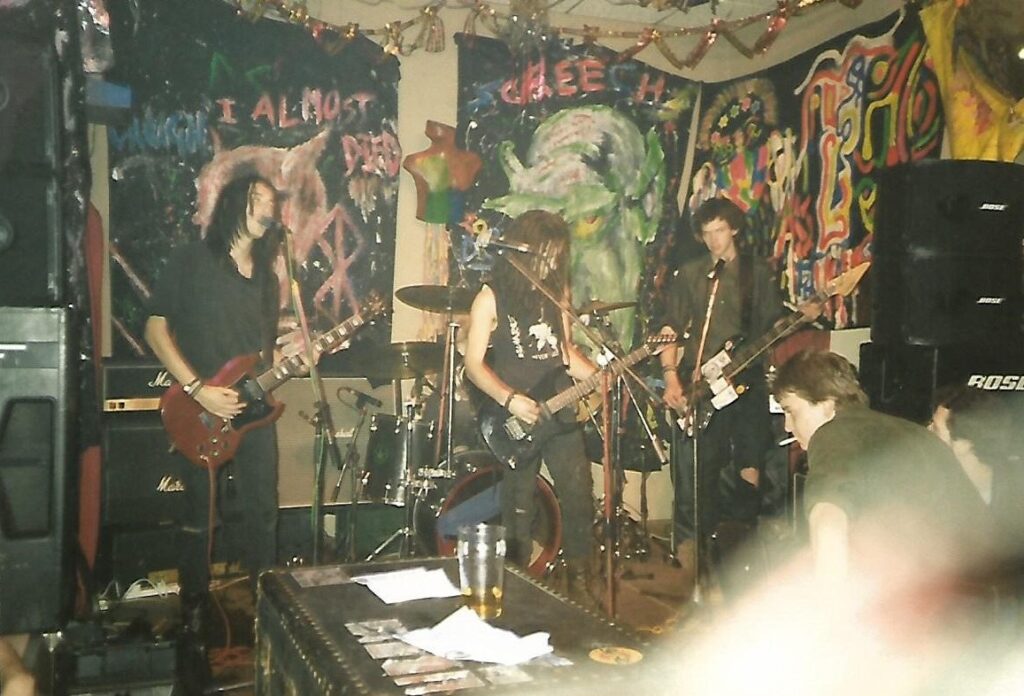
“It was recorded with all the knobs turned up to the max, whatever they were”
How do you recall working on your demo tape, ‘The War Is Big Business?’ Tell us about those tracks.
It was recorded in some sound engineer’s house in Leamington Spa. It was a standard Victorian terrace house (with very thin walls), and we recorded it live, at full volume, with each of us in different rooms. I think Stick was in the kitchen with all his drums, and I think I played in the toilet. There were cables all over the place, and it was recorded with all the knobs turned up to the max, whatever they were.
The tracks kind of speak for themselves. We had rehearsed them solidly for a few months and just went straight in there and let rip. It was recorded over a couple of hours, and it was all probably on the first take. We knew them inside out. The last song, ‘Terminal Filth Wimpcore Killer,’ was made up there and then, as we had some spare time. It was a piss-take of our mates in Deviated Instinct, who had released a demo called ‘Terminal Filth Stenchcore.’
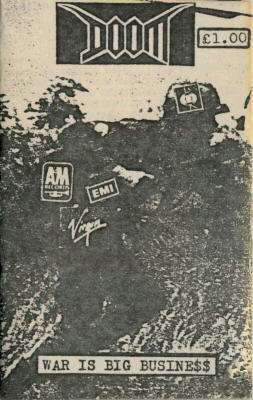
Can you elaborate on how Peaceville Records got in touch with the band?
I think the story is this: We knew Hammy through his band Civilised Society? and he came to see us playing at The Mermaid and must have thought it was alright. He was just starting up a record label and asked us to record something.
What influenced the Doom sound?
It was kind of everything we were listening to within the punk scene at the time, but mainly the Discharge clone punk bands from Scandinavia, like Discard, Asocial, Protest Bengt, Anti Cimex, etc. They were like Discharge but were really raw, fast, and ferocious. We loved Discharge too, by the way.
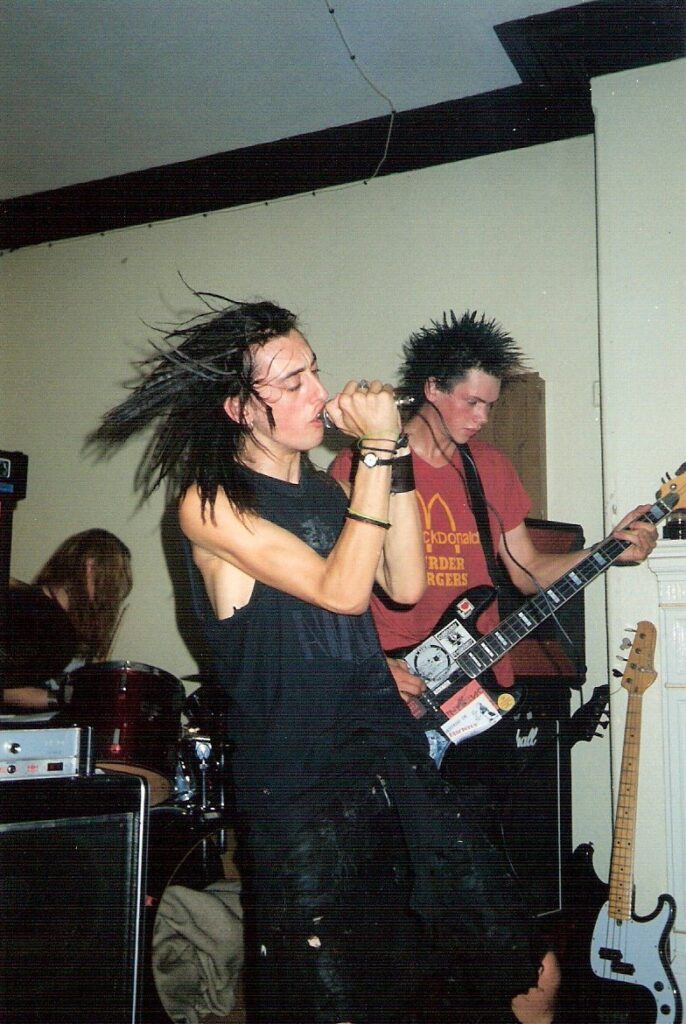
So, this leads us to ‘War Crimes: Inhuman Beings.’ You broke your wrist just before Doom’s recording debut, so bass player Jim Whitley (of Napalm Death and Ripcord fame) filled in on the recording. Tell us what you recall from working on it.
Yes, we were supposed to do a demo for a split compilation on Peaceville. I think it was a sampler album of things to come, probably to see what the response would be like. But on the weekend before the demo, there was a gig at The Mermaid. The Stupids were playing, and I jumped off the stage. Everyone moved out of the way, and I landed on my wrist. I didn’t really think much about it until the next day when I tried to play the bass. I couldn’t believe it. We knew Jimmy, and he said he would “fill in” for the demo. I was shitting it, as he was a much better bass player, and I thought they would kick me out for someone who could actually play.
‘The War Crimes’ album was recorded at Rich Bitch Studios in Birmingham. Lots of the local bands played there, and it was the place to go. We had rehearsed all the songs over the last few months and had done a load of gigs by this point, so we just went in and played them straight through live. I think all the twenty-odd songs were done in the same day. For some reason, it was recorded on videotape, and Stick had some sort of trigger on the snare (why, we still don’t know), which kept double-triggering every time he hit the snare. That was the only hold-up. It was our first recording in a “proper” studio, and I don’t think anyone knew what we were doing. We just went along with whatever the engineer said. I don’t remember much about it really, as you just get on with it. So, in the end, we were not happy with the sound, but I suppose it captures our raw quality quite well. If it had been too polished, it would probably have lost its edge and sounded like everyone else. I think that is a problem with a lot of bands today.
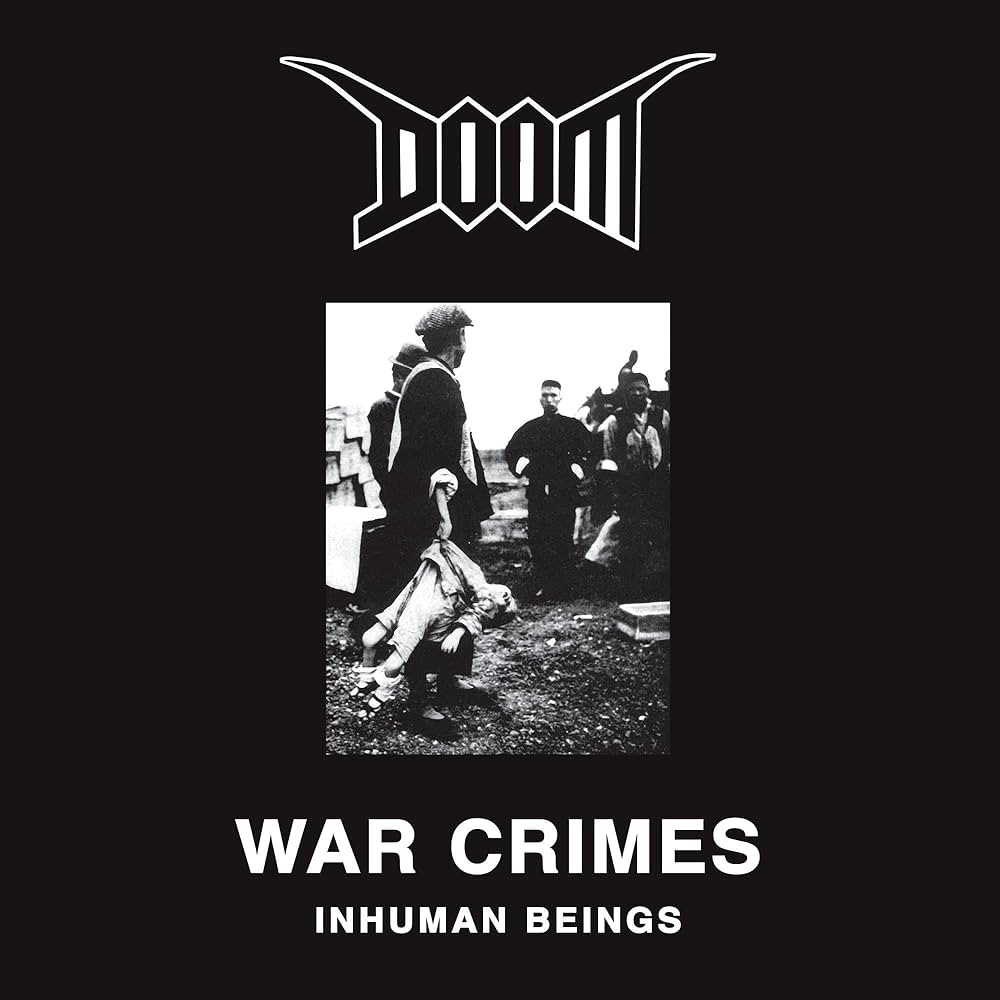
What about the ‘Police Bastard’ EP?
The ‘Police Bastard’ EP was recorded at the same time as the songs on the ‘No Security’ split album. I think we made some up there and then to fill up the time.
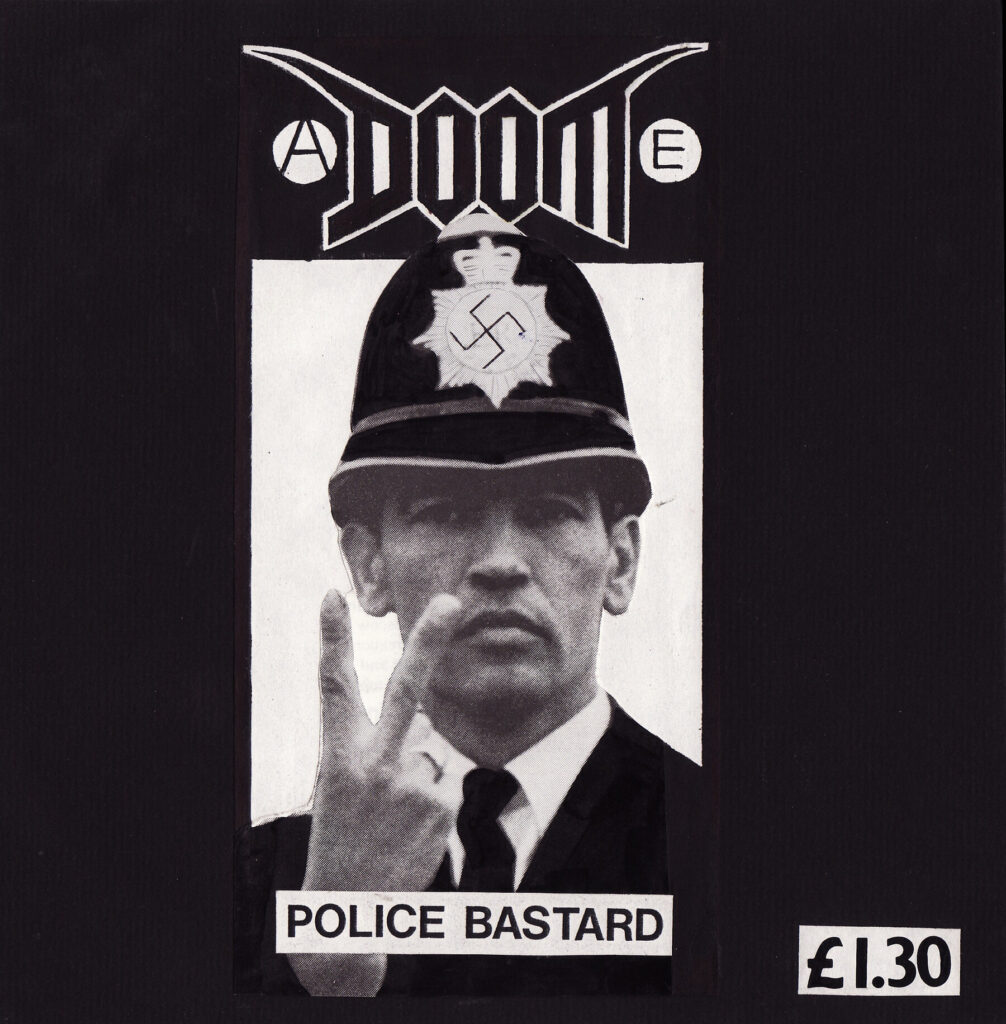
Then there’s a split with No Security, ‘Bury the Debt (Not the Dead).’
It was recorded in Worcester at Bird Song Studios, and again, we just went in and let rip. We were quite serious and dedicated, and when we recorded, we just got on with it with no messing about. It cost a lot of money to record! We usually had to borrow it and get it done super quick. I think for the first album, Stick’s granny lent us the money. We did have a “kitty” later, where we would pool any money left over from the gigs. I think we paid for this split ourselves. I don’t remember anything about it, apart from some friends called Natalie and Mandy going for a walk along the river and some bloke flashing at them!
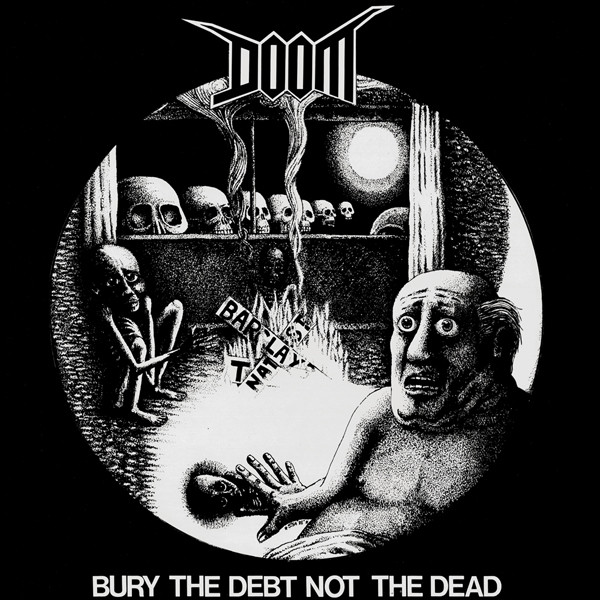
What do you recall from working on ‘The Greatest Invention’…?
‘The Greatest Invention’ was a bit surreal. We had split up a few years before. Meeting up with each other for the first time in ages was weird.
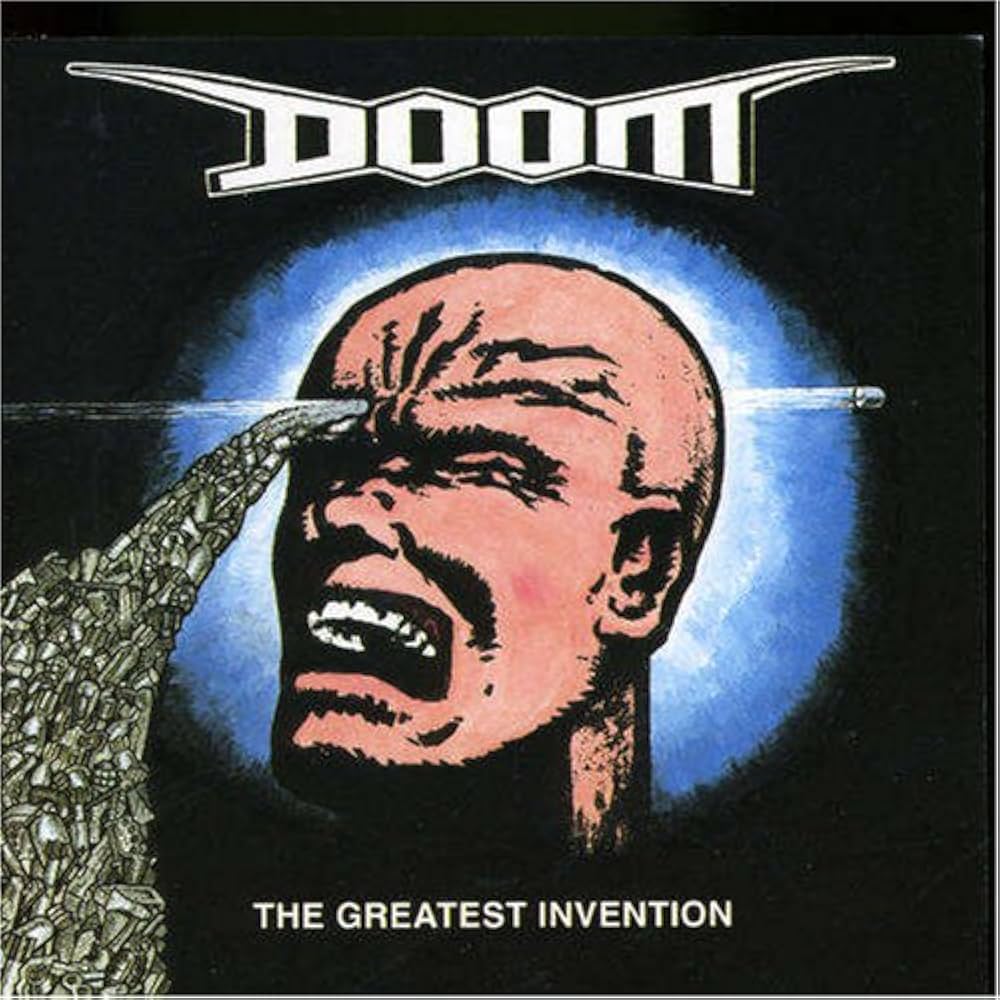
A Japanese label had offered us a recording deal and the chance to tour Japan, so we thought we’d give it a go and see what happened afterward. As usual, as soon as we started to play together, it was as if nothing had changed and no time had passed. We rehearsed for a day before recording and made up most of the songs then. We recorded it in a day and then mixed it a week later. I did not know when the mixing was going to happen, so I never went. There was no real communication between us, as we were not really sure of each other, I suppose. After the Japanese tour, Bri and Stick went off and started a new Doom.
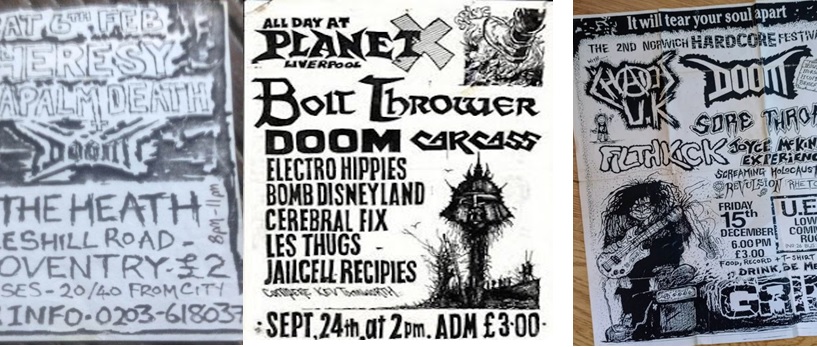
We did not speak again until some ten or fifteen years later. There was no falling out or anything; we just went our separate ways. We were probably sick to death of each other and needed a really, really, really long break.
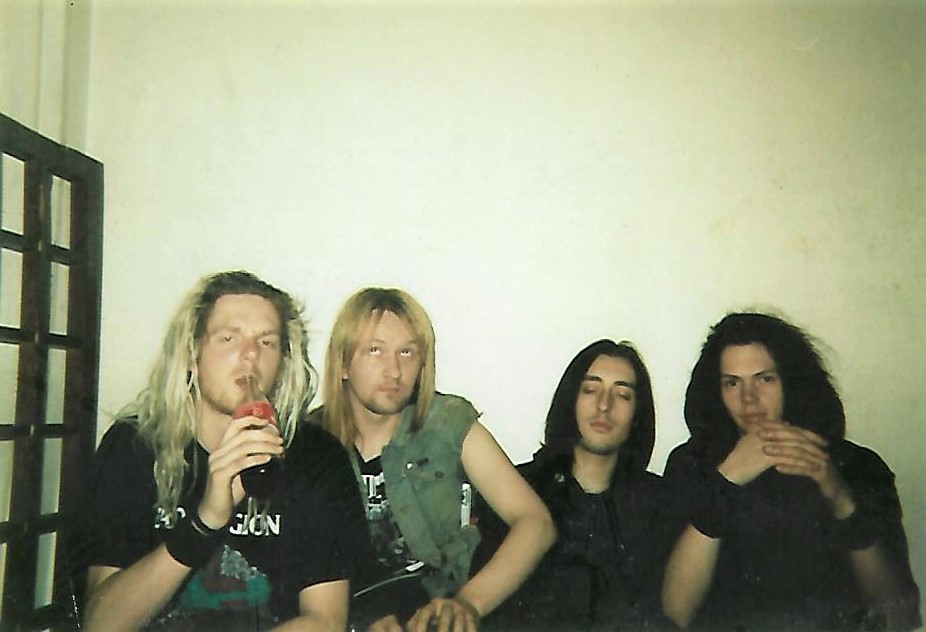
What are some of the bands you shared stages with and remember the most?
That is quite a hard question, as there were over a hundred gigs. I think we probably played with everyone at some point or other. The best gigs were usually in Bristol, Bradford, and London. They were always rammed, and there was a real “buzz” going on.
What would be the craziest gig you ever did and why?
Most of the gigs, looking back on it now, were crazy, but at the time it was normal, with all sorts going on. The Bristol gigs were usually bonkers. One squat gig we did was in this large round Georgian building. We were not supposed to be playing, but since the whole band was in the audience, we were persuaded to play. The trouble was, we were arseholed. I fell into the drum kit at one point and I had this huge wide-brimmed hat I had found from somewhere. It kept falling over my eyes, and I did not know what the fuck was going on. The atmosphere was just like one massive party, with everyone going ballistic to all the different bands, fuelled by lethal doses of scrumpy. It went on all night and probably all the next day. Most of the squat gigs were like that. They were just like massive parties and had a really joyous spirit, with no wankers spoiling it.
All the gigs abroad were crazy. The scenes in Holland, Germany, and Italy were really active at this point, and we would meet some really “switched-on” cool people. In some of these places, there was a real sense of community; you really felt like you were home from home and things were happening. And the band went down well.
I saw a really cool pic while you were traveling with a van across Yugoslavia…
That was part of the European tour with Concrete Sox. It was Chaos U.K.’s tour bus. Its favorite trick was to break down a lot. In the picture above, we had lost the radiator cap in the middle of the mountains, and someone fixed it with a raw egg! The gig in Zagreb was huge, with both bands going down really well. The crowd went berserk. I think they must have been starved of entertainment or something. At the end of the gig, we got mobbed by loads of well-wishers (I think) and had to “leg it” back to the van. Weird! We were refused entry to Yugoslavia at first, so we had to find a quiet crossing in the hills. The customs officers did not like the look of us and put us “through the grinder” a few times. After sweating for hours at the border, they let us through.
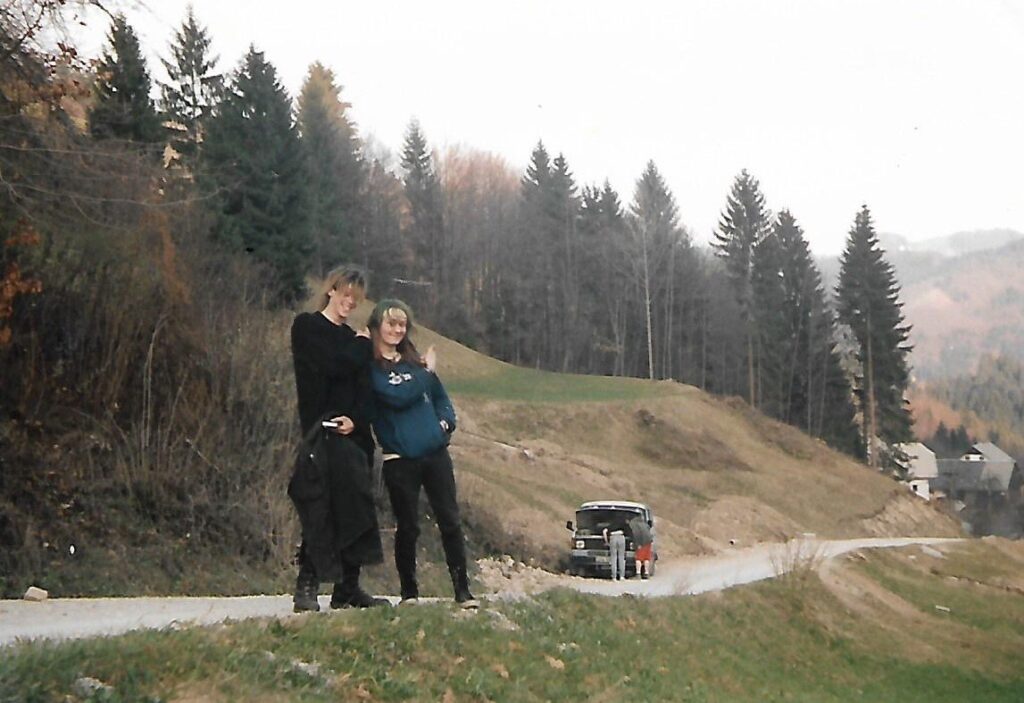
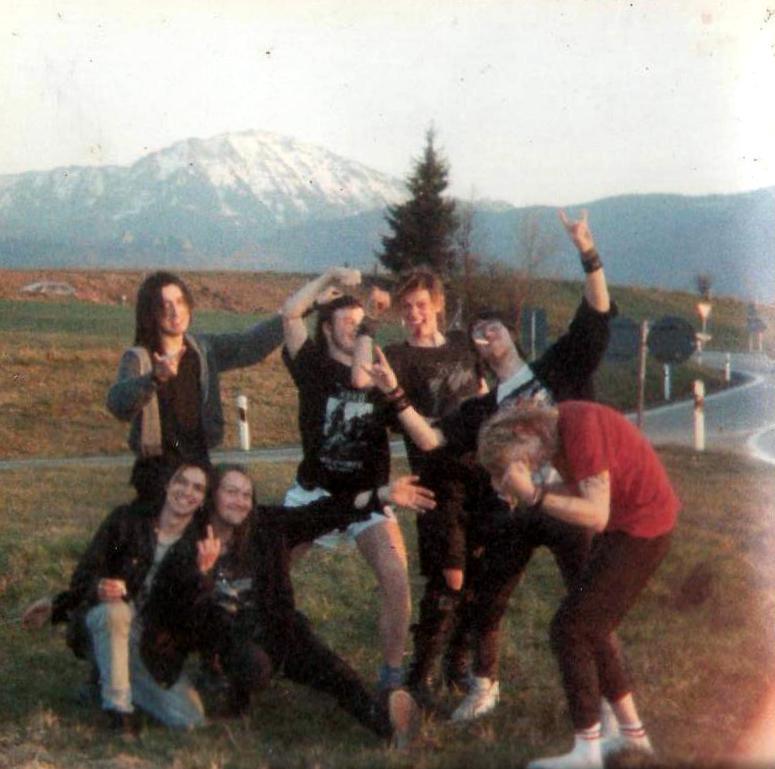
There were several lineup changes. What was happening at the time Pickering formed Cain and you joined Extreme Noise Terror along with Stick?
There were a few lineup changes. Sometime after the European tour, Bri left and moved to Bradford. I do not actually know why, and I’m not sure he knows either! We carried on as a three-piece for a while, but it did not feel right. We asked a few people to come in and try it out, but it never really worked. It was nothing to do with them.
Stick had joined E.N.T. and they needed a new bassist, so they offered it to me. E.N.T. was one of my favorite bands at that time, and I was “totally stoked.” I think I only did about twenty gigs with them and recorded the split with Filthkick. Great gigs!
However, we were offered to do the Brit Awards, and I did not want to get involved with that sort of commercialism. Just before, we had an interview with MTV, and I thought the same of that too, so I left. It was a bit of a wrench, as they were good lads, and I felt like I’d let them down, especially when they were off on a Japanese tour in a few months. But I had had enough of the “scene” by then and wanted to try something new.
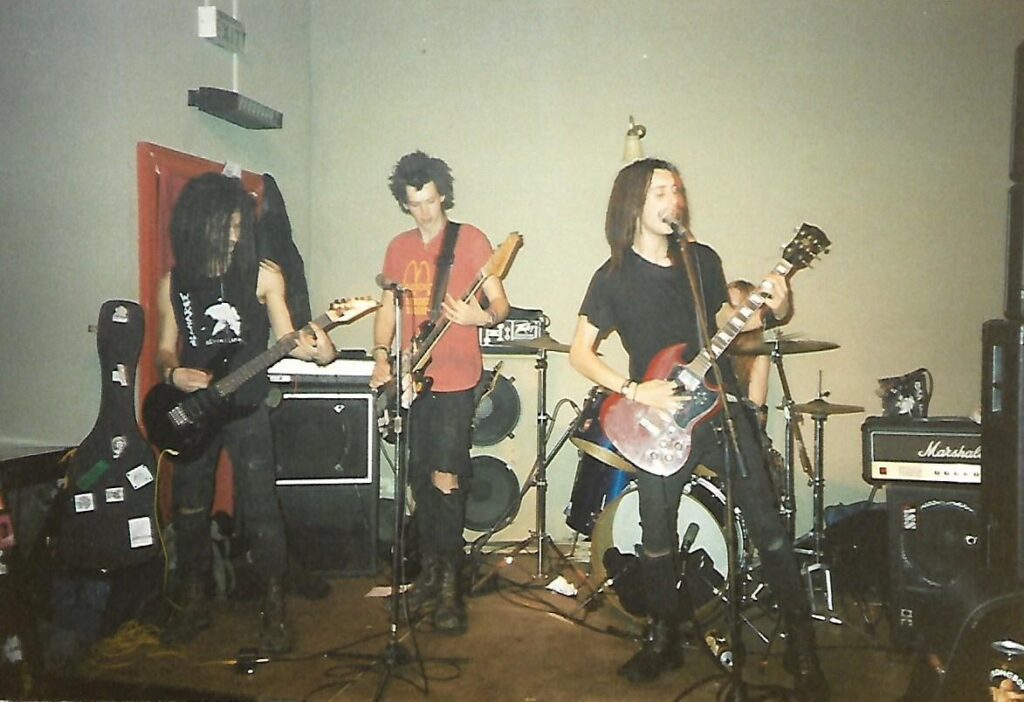
Looking back, what was the highlight of your time in the band? Which songs are you most proud of? Where and when was your most memorable gig?
My favorite gig with E.N.T. was at the London Greyhound. There were lots of people at the gig, and it was filmed. I think it was the largest gig, apart from Zagreb, that I ever played at. I wouldn’t say I was “proud”; I would say that I’m glad I helped write a few songs with E.N.T. However, on the whole, I am not very keen on the record. For one reason, Phil was not on it, and to me, he is a major part of E.N.T., so it did not seem the same without him. Also, the songs were belted out, and I don’t think we had time to gel enough, so it does not sound quite right.
Doom highlights for me were the ‘Bury the Debt’ split. We had found our sound and were working together as a real unit. In fact, all of my time in Doom was a highlight.
“A sort of rebellion against the rebellion”
Not long after, you joined Filthkick and Cain. Tell us about those bands.
I had been in bands playing the same style for years by now, and I felt the whole scene had become a bit jaded. There seemed to be a general lethargy throughout, and I wanted to start experimenting with different styles. For me, the scene had become too rigid and dogmatic; it was too claustrophobic. If you tried to do anything different, you would just get a load of shit. I loved punk and what it stood for, but I was sick of it all. The early punk scene was much more creative, with loads of different-sounding bands, each having its own individuality. To me, everyone now sounded the same. You had to conform! The members of both Cain and Filthkick thought the same. We wanted to try something else. We were listening to all sorts of different music and wanted our “music” to reflect that. That is when Jon formed Cain and I joined Cain and Filthkick.
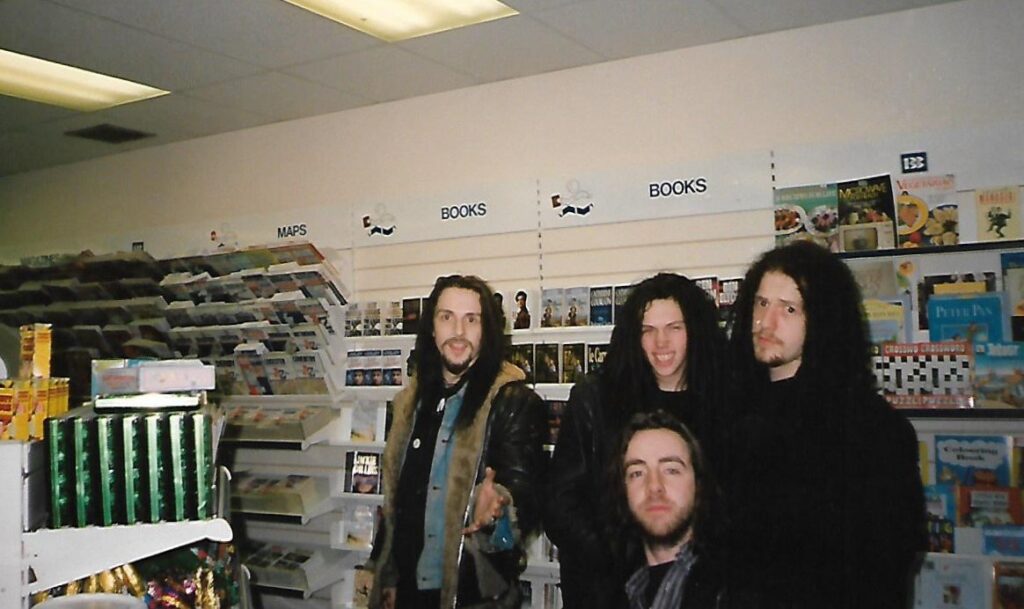
Filthkick needed a new bassist, and they offered it to me. Well, I said “they,” but there was only Leggo left in the band. He had done something, pissed everyone off, and they had all left. I don’t know what he did, and I didn’t really care. He was a mate; we shared a house, had similar attitudes, and he had already scraped the barrel, leaving me as the only one left. We were all feeling the same way about the punk scene and wanted something new. Fueled by a 24/7 diet of horror movies, vast amounts of booze, and other things, we were becoming, let us say, a little cynical. Well, “nihilistic” is probably closer to the word. Filthkick was a punk band in attitude. It was a protest against what the scene had become—a sort of rebellion against the rebellion. With shock imagery and themes (closer to what the original punk scene was about: freedom of expression), we wanted to cause some sort of reaction and create something new. With a shared warped sense of humor, we would just wind up the new squares and pushed it too far. Some of it was meant to be like holding a mirror to the world and showing how completely fucked up it had become. Some of it was meant to be a wind-up, and some of it was just plain stupid and childish. In the end, perhaps we climbed up our own arses too much and became constipated, lost in the void of our own shit. Hahahaha!
We were listening to bands like God Bullies, Zeni Geva, Whitehouse, Jesus Lizard, Drunks with Guns, and Upside-down Cross, so you get the picture. Neil and Leggo had a drunken argument about Nietzsche’s Zarathustra or something and didn’t talk to each other for months on end. So, the band just fell apart. Really, we partied too much and got sick of each other. Living in a shithole and being broke all the time, it all kind of fizzled out. We had probably become too nihilistic and didn’t give a shit about anything anymore. The music seemed to have become secondary, so I left.
Cain and Filthkick shared band members. We lived in two houses near each other and all hung out together with a similar outlook. Filthkick was an expression of the grungy, noisy stuff we were listening to, and Cain was an expression of all the Doom, metal, and psychedelia we were listening to. The two houses were the same but had a very different vibe. One was manic, and the other was chilled out. Both were, perhaps, a bit psychotic.
Cain recordings were fantastically issued by Rise Above Records. I would love it if you could tell us about some background.
We were all listening to all sorts of genres and just experimenting. We had always liked Black Sabbath and psychedelic, experimental bands, and it took on that shape. At the time, there were not many “Doom metal” bands around, and it seemed like a new and interesting approach. Watching horror films and listening to their soundtracks, we would turn our bleak and nihilistic outlook into something truly heavy. Recording the album was typical of the time—making do with what you had. The studio was in an old slaughterhouse. It was basically a fridge. The Filthkick album was recorded in the same place. Thankfully, it has never been released. The record company did not like it. Anyway, it was absolutely freezing in there. We took it in turns to stand under a light bulb to warm our heads. I kid you not! We would have a shitload to smoke and try to play with our hands stiff from the cold. However, the sound was fantastic and really encompassed our heavy minds! The album was released sometime in 1992, and for whatever reason, it was not really promoted. The band was too involved in existing to get it together enough to find some sort of promoter, and it too fizzled out.
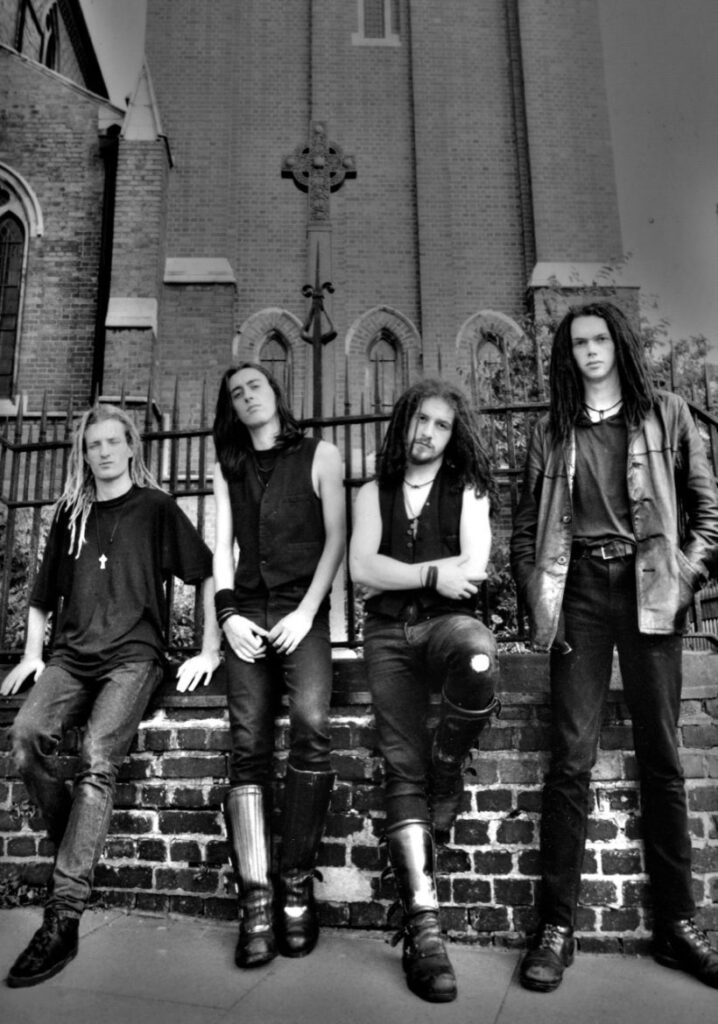
Lee Dorrian had suggested a while back that he would be interested in putting it on his label, and after a few years, we finally approached him with a new remastered version. The tracks were put in a more cohesive order, and the cover reverted to an old t-shirt we had made. The new version, I reckon, is far better and more complete than the original.
Cain are still going and are about to record something. They live too far away for me to continue, so they have a new bass player and have performed a gig. Watch this space.
There’s another project with your name on it called Lithium 6…
Lithium 6 was a strange time for me. I was becoming increasingly reluctant to have anything to do with music or scenes, and I had started to go to university and began to concentrate on that. It was a sort of industrial-sounding Killing Joke, with Jesus Lizard and Caspar Brotzmann influences. I played guitar, Neil from Filthkick played bass, and Simon programmed the drums, soundscapes, loops, and effects. I think there were going to be tape loops from films as the vocals.
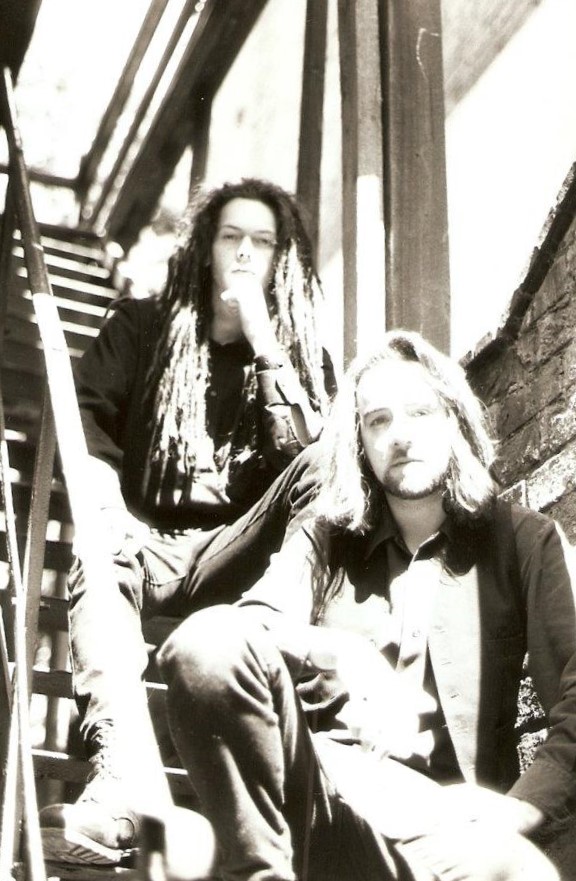
The following might not be entirely accurate. I wrote the riffs for the songs and was going to wait until they had recorded their tracks and overdub the guitars. On hearing the recordings, it sounded so good that I thought it did not need any guitars. Well, if it did, it certainly didn’t need any heavy rhythm guitars I had envisaged. It needed guitar lead highlights, maybe a bit like P.I.L. Anyway, they recorded the next few songs, and I was listening to the first song when I heard some fucker playing guitar on it. Hahahaha! I was like, what the fuck! Hahahaha! It’s so Spinal Tap; it was funnier than anything else. They probably told me that they were going to use somebody else (who was really good, by the way), but I was not really interested anymore and probably forgot. Really, I had effectively left the band, I suppose. Anyway, that was it. There were no hard feelings or anything. I had known the other members for so long; they were and are like family. A few arguments and then all is forgotten. I think a few songs were put on some compilations.
When did you first begin working under the moniker of Corvus?
It was around 2007. I had not had anything to do with music for what must have been ten years. I did not look at the music press or have any communication with anyone from the past. I had bought myself a guitar and started to play along to Black Sabbath records in my spare time, and every now and then, a new riff would come out. In the end, I had about twelve songs written. I had all these songs and thought I might as well record them. If there was a build of momentum, I was to turn it into a band. Eventually, I recorded them with Bri from Doom in Bradford. We had not rehearsed, and he offered to play the drums on the ‘Left It Too Late’ demo.
There have been about eight or nine demos now, and they are just a blueprint for songs. I do the demos and put them on YouTube. Some songs are really bad, and some could be developed more.
What can you tell us about your 2020 album, ‘Left It Too Late’?
‘Left It Too Late’ came quite a bit later! I wouldn’t really call it an album. It’s just a demo. Blank Konflik Records were kind enough to want to release it, and I think about 200 copies were printed. It was about six years ago. It consists of the first five songs I recorded with Bri in 2007.
Later, Sanctus Propaganda Records were also kind enough to offer to release a CD. It consists of two demos, Adust (2009) and Tears of the World (2012). The recordings are quite rough, and the mixing was rushed and limited, but at least they are out there.
So, this is a completely different side from your beginnings…
Sort of. You can still trace the DNA. They are still an absolute racket!
Let’s end this interview with some of your favorite albums. Have you found something new lately that you would like to recommend to our readers?
Favorite albums. It depends on what sort of mood I’m in. It constantly changes, and I always miss out on something. It’s not very sophisticated, I’m afraid! I mean, if you start with Sabbath, I can argue all day about the merits of each individual album. I suppose the original unholy trinity of Black Sabbath, AC/DC, and Motörhead are always being listened to.
The albums that underpin everything are:
Black Sabbath: the first six albums
Motörhead: the first three
AC/DC: the first five
Hawkwind: second to the fifth and a couple of others
The Stooges: first three
Dead Kennedys: ‘Fresh Fruit for Rotting Vegetables’
Monster Magnet: ‘Spine of God’
Saint Vitus: ‘Born Too Late,’ but ‘Mournful Cries’ and ‘V’ are right up there
Trouble: ‘Psalm 9,’ although ‘The Skull’ and the self-titled ‘Trouble’ are all killer
Turbonegro: ‘Apocalypse Dudes’
Discharge: ‘Hear Nothing See Nothing Say Nothing’
Crass: first four
Sex Pistols: ‘Never Mind the Bollocks, Here’s the Sex Pistols’
Electric Wizard: ‘Witchcult Today’
Celtic Frost: first three, although ‘Monotheist’ is totally underestimated; it is truly heavy!
As for new stuff, I don’t really have enough time to listen to it. If I get some spare time, I am usually writing music rather than listening to new stuff. I do listen to a lot of movie soundtracks, looking for ideas and inspiration. The soundscapes to documentaries are also very good for this, like the science episodes of Horizon. I would say, but not very new, Triptykon’s ‘Melana Chasmata’ album is brilliant, especially the track ‘Boleskine House.’ Pillorian’s ‘Obsidian Arc’ is great, and Agalloch have reformed, so hopefully they will record something new. I always have time for the new Memoriam stuff. Killing Joke are still coming out with absolute classics too. The ‘Pylon’ album is very good.
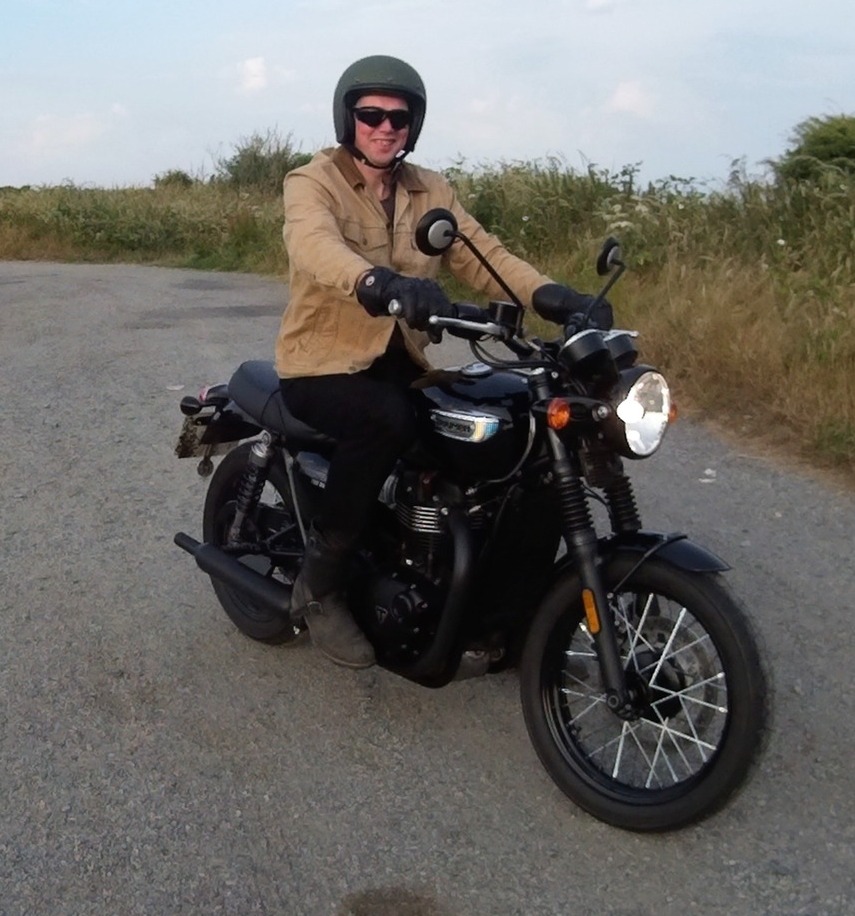
Thank you for taking your time. The last word is yours.
Never, ever let the fuckers grind you down.
Klemen Breznikar
Headline photo: Pete Nash
All photo materials are copyrighted by their respective copyright owners, and are subject to use for INFORMATIONAL PURPOSES ONLY!
Corvus Bandcamp

